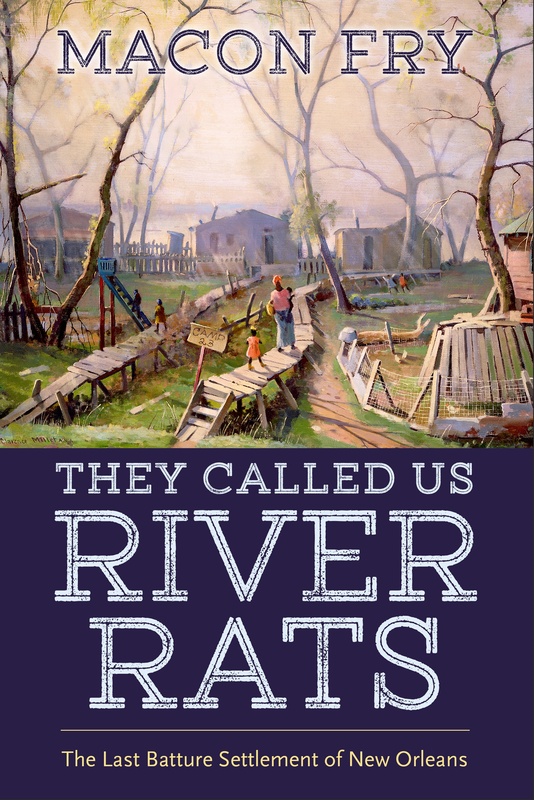
They Called Us River Rats
The Last Batture Settlement of New Orleans
They Called Us River Rats: The Last Batture Settlement of New Orleans is the previously untold story of perhaps the oldest outsider settlement in America, an invisible community on the annually flooded shores of the Mississippi River. This community exists in the place between the normal high and low water line of the Mississippi River, a zone known in Louisiana as the batture. For the better part of two centuries, batture dwellers such as Macon Fry have raised shantyboats on stilts, built water-adapted homes, foraged, fished, and survived using the skills a river teaches.
Until now the stories of this way of life have existed only in the memories of those who have lived here. Beginning in 2000, Fry set about recording the stories of all the old batture dwellers he could find: maritime workers, willow furniture makers, fishermen, artists, and river shrimpers. Along the way, Fry uncovered fascinating tales of fortune tellers, faith healers, and wild bird trappers who defiantly lived on the river.
They Called Us River Rats also explores the troubled relationship between people inside the levees, the often-reviled batture folks, and the river itself. It traces the struggle between batture folks and city authorities, the commercial interests that claimed the river, and Louisiana’s most powerful politicians. These conflicts have ended in legal battles, displacement, incarceration, and even lynching.
Today Fry is among the senior generation of “River Rats” living in a vestigial colony of twelve “camps” on New Orleans’s river batture, a fragment of a settlement that once stretched nearly six miles and numbered hundreds of homes. It is the last riparian settlement on the Lower Mississippi and a contrarian, independent life outside urban zoning, planning, and flood protection. This book is for everyone who ever felt the pull of the Mississippi River or saw its towering levees and wondered who could live on the other side.
They Called Us River Rats, a labor of love more than two decades in the making, is many things—memoir, natural history, geography, cultural and political history—but above all it is an effort to redeem a way of life that exists under perpetual threat of annihilation. As the batture goes, so goes New Orleans.
They Called Us River Rats is a beautiful addition to Mississippi River history and lore, told with Fry’s genial and distinctive voice, his self-deprecating humor.
They Called Us River Rats is very well written, painstakingly researched, and contains several excellent and educational illustrations. It’s the total package.
The richness of these stories comprises the core contribution of Fry’s book. Some of them recount personal experience. Other vignettes Fry drew from oral interviews he conducted late in the twentieth century with individuals who inhabited batture settlements between 1927 and 1954. Reflecting both continuity and change, they offer a different perspective on a three-hundred-year-old city.
Fry’s intense interest in his quirky settlement prompted him to delve into its history and people. . . . Given his experience and sleuthing, Fry is well positioned to write about all these things, and he does so in nicely descriptive and occasionally elegiac prose.
Fry draws upon his years of writing to compile the stories of his experiences as well as his interviews with dwellers in the batture—fortune tellers, faith healers, and wild bird trappers. They Called Us River Rats is delightful reading and recommended for school, academic, public, and science libraries.
The batture has long been the most liminal of spaces in New Orleans, part land, part water, part urban, part rural. Here, finally, is the inside story of the city’s last batture community, told by long-time ‘river rat’ Macon Fry. Readers will learn how life in one of America’s most unusual neighborhoods imparts an important lesson about living with nature.
Macon Fry’s They Called Us River Rats is a tour through a landscape most people never hear about—the thin brown line of occupied borderland between New Orleans’ Mississippi River levees and the river itself. Few souls have been hardy enough to stake a claim there and stick it out through storms, floods, and the attrition of time. Fry is one of them, and this book—part memoir, part natural history, part social history—is a unique, fascinating ride.
A very cool book about a very cool place to live.
The New Orleans batture lies on the banks of the Mississippi River, outside of the city’s levee system, not a place just anyone would want to live, as Macon Fry has done for decades. They Called Us River Rats is a captivating recounting of that time, but also a history of the community, who for centuries, has chosen to call the batture home. His exhaustive knowledge of the river and its denizens is enhanced by his narrative mastery and elegant prose. Fry’s book is an exceptional and very necessary addition to the New Orleans literary and historical canon.
Macon Fry is an author, writer, and educator. He arrived in New Orleans in 1981 to record and write about the unique culture and folkways of south Louisiana. For the past thirty years he has lived on the watery fringe of New Orleans, occupying a self-built stilt house over the Mississippi River, hidden by the huge levees that keep the city dry.




